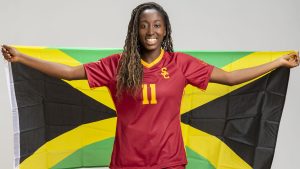- Slug: Sports-Reggae Girlz Soccer. 716 words.
- File photo available.
By Victoria Samuels
Cronkite News
LOS ANGELES – Time to dance.
The Jamaican women’s national soccer team, dubbed the “Reggae Girlz,” qualified for its second straight Women’s World Cup earlier this month and remain the only Caribbean nation to punch a ticket to the big stage.
Allyson Swaby, an American-born defender at Angel City FC, was a member of the first Reggae Girlz team to earn a Women’s World Cup berth in 2019, after playing on the pitch for the U.S. women’s national soccer team until 2018. Swaby’s sister, Chantelle, is also a member of the Jamaican national team and plays for the Rangers Football Club in Scotland.
Swaby says that the reality of representing Jamaica with her younger sister has yet to set in.
“Our family is super proud,” Swaby said. “We know it’s something special, and when we look back we will realize how great it is. But right now we are just enjoying getting to play with one another.”
Jamaica automatically qualified for the 2023 Women’s World Cup in Australia/New Zealand after reaching the semifinals of the CONCACAF W Championship and finishing the tournament in third place.
Jamaica shut out Haiti, 4-0, in their final match of Group A of the Concacaf W Championship. Khadija Shaw, a striker for Manchester City, scored two goals to lead the team to the semifinals, where they would go on to fall, 3-0, to Canada. Trudi Carter, a midfielder for FC Gintra, and Drew Spence, a midfielder for Tottenham Hotspur, each added a goal in the Haiti win. Jamaica finished the tournament in third place behind a 1-0 victory over Costa Rica.
The ride was only made possible for the Swaby sisters and their teammates thanks to FIFA’s eligibility rules, which allow a player to represent Jamaica if their parents or grandparents were born in the country. And so, the Swaby sisters are far from the only American-born players on this year’s national team.
“It may not be representing the country where I’m from,” Adamolekun said. “But I’m also representing my mom’s country, which you know, Jamaicans are very proud and we were very proud people. … It’s like it’s just a big family. You’re always connected no matter what.”
Adamolekun was also a member of the historic 23-player Jamaican team to advance to the 2019 Women’s World Cup in France. The 21-year-old said she was shocked at the overwhelming support the Reggae Girlz received in a country far away from home at the time.
“The energy of us going to that first World Cup, in the first game, I’m thinking, there’s not going to be that many Jamaican flags,” Adamolekun said. “There were a lot of flags that I was like, they’re coming out to support us”
Swaby says she immediately noticed similar differences in playing for the U.S. and Jamaica, and felt the same warmth.
“I had completely different experiences with the U.S. youth team, and the Jamaican senior national team,” Swaby said. “I think that when I was with the Jamaica team it just felt like home right away.”
Swaby said she’s most proud of her Jamaican heritage because the culture has a unilateral reach, despite the island’s small size. That unique culture is just now starting to extend to the soccer field in recent years.
“Everybody knows about reggae music, everybody knows about track and field,” Swaby said. “The influence is way beyond what you would expect from such a small place.”
Jamaica will begin its World Cup campaign next July, and groups will be allocated this October. In the 2019 World Cup, Jamaica faced Brazil, Australia and Italy in the group stages. After consecutive losses to all three countries, Jamaica went home failing to advance to the knockout stage.
This time next year, we will see if Jamaica is still dancing.
For more stories from Cronkite News, visit cronkitenews.azpbs.org.
Links:
https://www.instagram.com/p/CgNDrWcu-7r/
https://www.instagram.com/p/CgNGAqxgMVN/?hl=en
